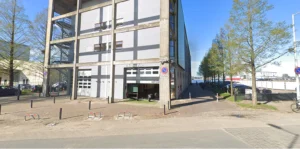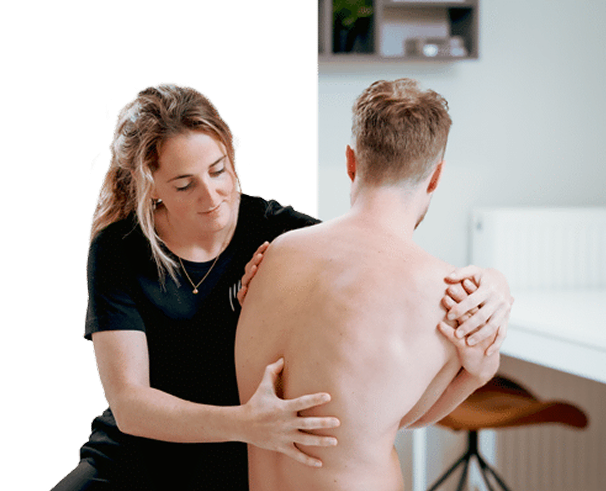Physical complaints
Jaw pain
Do you suffer from nagging pain in your jaw, difficulty chewing or a snapping jaw when opening and closing. Jaw problems are more common than you think and can significantly affect eating, talking and sleeping. With proper guidance and physical therapy, recovery is quite possible. On this page you can read exactly what jaw problems are, what the possible causes are and how to tackle them effectively.
What are jaw problems
Jaw pain is discomfort in and around the jaw joint, chewing muscles and the control from neck and shoulder girdle. Pain may feel localized at the jaw joint in front of the ear or radiate to cheek, temple, ear and neck. You may hear sounds such as clicking or a sensation of jaw snapping. Sometimes there is a lump under jaw due to a swollen gland or cyst jaw. With tooth and molar problems, tooth pain may extend to jaw and even toward ear.
Symptoms of jaw pain
- Pain under jaw or pain at bottom of jaw when chewing, yawning or talking
- Jaw spasm or cramping during eating or stress
- Snapping jaw or jaw creaking when opening and closing
- Swollen jaw or thick jaw with pressure pain
- Stitch in jaw or pain in neck shoulder and jaw due to muscle tension
- Restricted mouth opening or feeling of blocking
Recognize these signs. Get your symptoms assessed early. Starting early accelerates recovery.
Causes of jaw pain
Many complaints arise from clenching jaw or teeth grinding, often during periods of increased tension or less sleep. Disturbed chewing and head posture can activate trigger points jaw in the masseter muscles. Dental causes such as abscess jaw symptoms or toothache pulls through to jaw sometimes play a role. Abnormalities of the bone such as exostosis jaw or rarely osteonecrosis jaw belong to the dentist or oral surgeon. A lump can also fit with swollen gland jaw. Trauma gives bruised jaw symptoms and in cases of severe violence we watch for broken jaw symptoms. An inflamed mouth jaw or inflamed jaw ear pain may require medication. Questions about what medication for jaw inflammation or inflammation jaw antibiotics belong to your dentist or family doctor. In case of suspicion of tumor jaw or cyst jaw malignant we refer to mouth jaw facial surgery, also called poli jaw.
What you can do yourself
- Relax the jaws during the day. Teeth loose, tongue tip slightly behind upper teeth, lips closed
- Heat on masseter muscles and neck and then move gently
- Soft food in severe pain and chew evenly left and right
- Limit gum and hard bites. Schedule meal times and relaxation
- Does the pain get worse or the jaw continues to swell. Contact your dentist or doctor and schedule an intake with us
Treatment of jaw pain at The Physio Man
Our jaw physio examines the pattern behind your symptoms. We listen to your story and look at jaw movement, position of neck and head and muscle tension in masseter muscles, neck and shoulders. We coordinate with your dentist when appropriate and refer for oral maxillofacial care when there are signs.
A treatment program usually consists of
- Exercise therapy for control of opening closing and lateral sliding
- Muscle and tissue techniques and targeted jaw massage around masseter, temporalis and inner cheek
- Coaching on chewing and work habits and a plan for stress and sleep hygiene
- Advice on sleep position and pillow choice for neck strain
- Home program with clear boundaries so your symptoms decrease without relapse
Our goal is for you to be able to chew, talk and relax pain-free again.
Exercises and training
Exercises jaw relaxation form the basis. Start small and pain-free.
- Tongue position and restLaythe tongue tip behind the upper teeth against the palate and relax the lips. Exhale calmly. Ten gentle breath cycles.
- Controlled openingPlacetwo fingers on your chin. Slowly open straight down to a comfortable limit and close again. Ten repetitions.
- Side slide within pain thresholdSlidethe lower jaw a little to the left and right. Five to 10 repetitions per side.
- Neck and shoulder Chinslightly retract and keep shoulder blades low. Ten repetitions. This lowers muscle tension in neck and reduces pain in neck shoulder and jaw.
Jaw muscles training is done with control and relaxation. Forcing or repeating a lot without rest actually stimulates. Jaw squatting deliberately provokes we advise against it.
Collaboration with dentist and oral surgeon
Sometimes additional care is needed. For abscess jaw dangerous, hard swelling jaw, persistent swollen jaw or suspected cyst jaw we refer to dentist or oral maxillofacial surgery. The oral surgeon assesses when imaging or treatment is needed, such as cyst jaw removal or exostoses jaw. In trauma, we watch for jaw broken symptoms in addition to bruised jaw symptoms. For obvious postural abnormality or crooked jaw cause, we review the best route together.
When immediate help is needed
- Fever, increasing swelling or difficulty swallowing or opening the mouth
- Persistent severe tooth and jaw pain with night aggravation
- Visible misalignment after trauma or inability to clamp or open
- Unexplained rapidly growing swelling or numbness in lip or chin
In these situations, contact dentist, family doctor or the emergency line of oral maxillofacial surgery immediately.
Frequently Asked Questions
My jaw clicks or snaps. Is that dangerous
A snapping jaw is often due to disc and muscle control. As long as the pain remains low and the mouth opens properly, it is usually harmless. With focused control and rest, the sound often decreases.
What to do in case of a lump under the jaw
This could be a swollen lymph node from a cold, a salivary gland or something dental. If swelling, redness or fever persists, see your doctor or dentist. We help with tension and posture around neck and jaw.
Do exercises really help against clamping
Yes. Exercises jaw relaxation, breath regulation and daytime awareness reduce muscle tension. Sometimes the dentist recommends a night guard. The combination works best.
May I loosen my jaw myself
Gentle jaw massage on the outside is allowed. Oral pressure or aggressive techniques are not recommended. Have mobilizations performed by a professional.
Your next step
Don’t stick around with clicking, pain or tension in your jaw. With a clear diagnosis and a smart plan, you will regain jaw and neck peace and confidence in chewing and talking.
Make an appointment at The Physio Man now and work with us to achieve a calm, strong and pain-free jaw.
Share this article:
Share this article:


